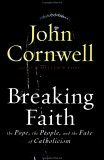As John Paul II’s papacy darws to a close, the Catholic Church, its policies, and its future are being scrutinized around the globe. The election of the next Pope will have a greater impact on world affairs than that of the next president of the United States – or the leader of any single nation. In his acclaimed bestseller Hitler’s Pope, John Cornwell eloquently expressed both disagreement with the Catholic Church and his own deeply felt commitment to it. Now he examines a Catholic Church in crisis, in a penetrating overview of an institution at the crossroads.
Breaking Faith addresses issues that range from the core concepts of everyday practice to the organization of the Church worldwide – the “graying” of the priesthood, the growing discontent among women religious, the determination of the hard-line conservative movement to close ranks against any hint of dissent – and finally, the power of Rome, the role of the Pope, and the lasting effects of John Paul II’s autocratic rule.
Cornwell probes beyond the statistics – the rising incidence of priestly pedophilia, the falling number of people attending church, the bizarre calculations behind the Vatican’s saint-naming procedure – to reveal the everyday crises on the parish level: the dilemma of the gay or divorced Catholic who wants to remain in the Church; the forced hypocrisy on sexual conduct and abortion; the vexed role of women. What will happen when John Paull II’s handpicked cardinals come together to elect the next Pope? Will there be some accomodation to the progressive elements, or will an emphatically conservative new Pope forced the Church to the breaking point?
This is at once a deeply personal work and a book of disturbing, eye-opening analysis. John Cornwell has spent a lifetime thinking about individual choice and the Catholic Church, and argues that the Church is still a vital channel for good works and a source of broad moral direction, even for those who are not bound by its strictures. The devastating potential for schism is real – but so is the strength upon which the Church can draw to survive and thrive in the coming century.




